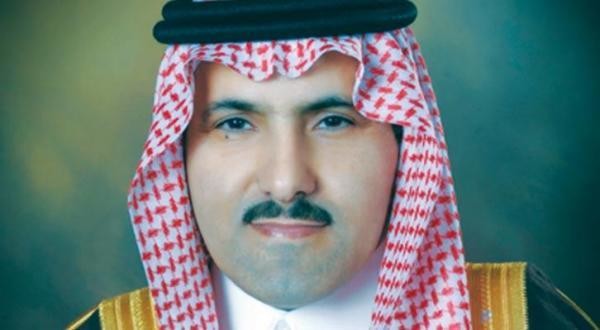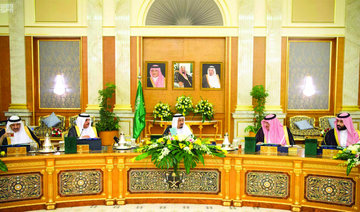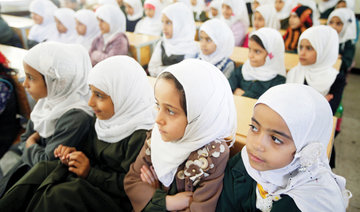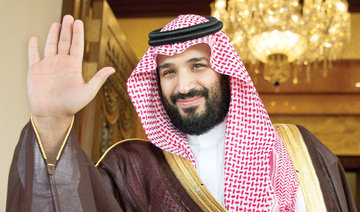WASHINGTON: As Yemen’s war enters its third year, a two-day workshop addressing the military, political and humanitarian challenges of the conflict warned of Houthi ties to Iran and their impact on legitimate institutions in Yemen.
Saudi and Yemeni diplomats both echoed the urgency for a political solution, and invited the Houthis to the table as a political party and not an armed militia.
The conference in Washington, organized by the Gulf Research Center, featured Saudi and Yemeni officials, as well as US defense experts and former US ambassadors to Sanaa. The meetings took place on Thursday and Friday at the National Council for US-Arab relations, and at the Army Navy Club respectively.
Saudi Arabia’s Ambassador to Yemen Mohammed Al-Jaber stressed the need for a fair political solution to the conflict. “We invite the Houthis to the negotiating table, and we are more than open to a political solution,” he said.
His invitation, however, was paralleled with heavy criticism of the Houthis as an armed militia, accusing them of “selling Iran’s provided weapons to Al-Qaeda in Yemen.”
Al-Jaber also lambasted Iran’s “clear position... to destroy and undermine Yemen,” accusing Tehran of “supporting Houthis’ terrorism.”
The Saudi diplomat defined Riyadh’s role as “non-discriminatory and non-sectarian,” stating that its aid “goes to all the legitimate parties in Yemen.”
He stressed that the Hodeidah port “needs to be under the control of the international community so that aid can be distributed to the Yemeni people.”
Yemen’s Ambassador to Washington Ahmed Awad bin Mubarak defined the goal of a “political solution that preserves the Yemeni state and institutions” in ending the conflict.
Mubarak maintained that the Saudi-led coalition forces “are pushing for a political solution” to the war.
The Yemeni diplomat however sounded the alarm over the Houthis’ armament, saying that “for Yemen’s future, we can allow the Houthis as a political party but not as armed militia.” Mubarak offered heavy criticism of the Houthis, saying that “their leaders promote just as much extremism and violence as Al-Qaeda.”
In that capacity, Mubarak said Saudi Arabia’s decision to intervene was “the only option to prevent non-state actor from taking over Yemen.”
Former US Ambassador Gerald Feierstein stressed three goals for Saudi Arabia in Yemen. First is the “need to preserve legitimate Yemeni government,” and second is to “prevent further Houthi and Iranian expansion,” while the third goal is to protect the Saudi-Yemen border.
These goals were reiterated by the head of the Gulf Research Center (GRC) Abdulaziz Sager, who warned about letting Yemen “turn into another Lebanon with (a) violent non-state actor (Houthis) dominating the country’s security forces.” Sager said that the “coalition is trying to end the war but Iran is preventing it by financing violent non-state actors.”
In that context, Mustafa Alani, a defense analyst at GRC drew a red line for Saudi Arabia in Yemen, contending that the Kingdom cannot accept Houthi control over Yemen. “It would be a major strategic threat blocking all access to the sea,” he said. “The Houthi siege was a reality check for Riyadh (in 2015) after allowing the armed Houthi movement to grow in early 2000s.” Alani pointed out the difficulties and the complexities of the war, and that “there is no magic solution.” He said that any Hodeidah operation “is a high cost with less benefits. We aren’t prepared.”
The two-day conference framed Saudi Arabia’s military role in Yemen as “one of necessity and not choice,” and noted increased US-Saudi defense cooperation following US Secretary of Defense James Mattis’ visit. It highlighted the challenging humanitarian and economic terrains in the conflict, without, however, providing a clear exit strategy.
Houthis selling Iranian weapons to Al-Qaeda, says Saudi diplomat
Houthis selling Iranian weapons to Al-Qaeda, says Saudi diplomat

Israel denies entry to Jerusalem for Palestinian Christians marking Palm Sunday

- Israeli restrictions at checkpoints around Jerusalem require Palestinians to obtain security permits to access religious sites
- Only 6,000 permits were issued this year to the West Bank’s 50,000 Christians
LONDON: Israeli authorities prevented Palestinian Christian worshippers from entering Jerusalem from the occupied West Bank to participate in Palm Sunday.
Israeli authorities imposed strict restrictions on Jerusalem over the weekend, limiting the access of Palestinian Christians to the city, the Wafa news agency reported.
Only a limited number of worshippers, primarily residents of Jerusalem and Palestinian citizens of Israel, were able to attend religious services at Jerusalem’s Church of the Holy Sepulchre, Wafa added.
Palm Sunday marks the beginning of Holy Week leading up to Easter. It commemorates the entry of Jesus Christ into Jerusalem and is observed by Eastern and Western Christian churches.
On Sunday, Patriarch Theophilos III of the Greek Orthodox Church and Latin Patriarch Cardinal Pierbattista Pizzaballa led liturgies attended by the clergy and a small group of worshipers.
Israeli restrictions at checkpoints around Jerusalem require Palestinians — Muslim and Christian — to obtain permits to access religious sites, including the Al-Aqsa Mosque and the Church of the Holy Sepulchre.
Father Ibrahim Faltas, Vicar of the Custody of the Holy Land, noted that only 6,000 permits were issued this year to the West Bank’s 50,000 Christians. Permit issuance requires a security clearance and often asks that applicants download a mobile application managed by Israeli authorities.
“This is the second consecutive year that only a small number of pilgrims are able to participate in Holy Week and Easter celebrations in Jerusalem due to the ongoing conflict (in Gaza),” Faltas told Wafa.
“Churches would continue to pray for peace, justice, and freedom for all people in the Holy Land,” he added.
The Catholic Palm Sunday procession took place on Sunday afternoon, starting from Jerusalem's Church of Bethphage and ending at the Church of Saint Anne.
Christians gathered for services at the Holy Family Catholic Church and Saint Porphyrius Greek Orthodox Church in the Gaza Strip amid the ongoing Israeli attacks since late 2023. In the West Bank, Palm Sunday services were held in churches throughout Bethlehem, Jericho, Ramallah, Nablus, and Jenin.
Syrian President Sharaa heads to UAE on official visit - SANA

CAIRO: Syrian President Ahmed al-Sharaa will travel to the United Arab Emirates for his second visit to a Gulf state as president on Sunday, Syria's official news agency reported.
He will be accompanied by foreign minister Assad al-Shibani, who visited the UAE earlier this year.
They are expected to discuss issues of mutual interest, the SANA state news agency reported.
Sharaa visited Saudi Arabia in February on his first foreign trip since assuming the presidency in January.
His visit to the UAE comes as the new Syrian leadership attempts to strengthen ties with Arab and Western leaders following the fall of Bashar al-Assad in December at the hands of Sharaa's Sunni Islamist group, Hayat Tahrir al-Sham.
(With Reuters)
Indonesia, Egypt upgrade ties to strategic partnership on Prabowo’s Cairo visit

- Jakarta, Cairo established diplomatic ties in 1947
- Prabowo was on a multi-day tour to Middle East
Jakarta: Indonesia and Egypt elevated their ties to a strategic partnership during President Prabowo Subianto’s visit to Cairo, his office said on Sunday.
Prabowo and Egypt’s President Abdel Fattah El-Sisi signed the joint declaration following their meeting in the Egyptian capital on Saturday, the Cabinet Secretariat said in a statement.
“The signing of the joint declaration is an important milestone in diplomatic ties between the two countries, signifying Indonesia and Egypt’s strong commitment to elevate bilateral ties to a strategic level,” the statement reads.
“Through this strategic partnership, Indonesia and Egypt are committed to (strengthening) cooperation in various priority fields. From politics, economy, security, defense, culture and education ties, as well as people-to-people relations.”
Subianto was in Cairo as part of his multi-day tour to the Middle East and has visited the UAE and Turkiye. This was his second time in Egypt since taking office in October.
Egypt was one of the first countries to recognize Indonesia’s independence, with the two nations establishing diplomatic ties in 1947.
Both Jakarta and Cairo believe that their “strong and historic partnership” will provide “real benefits” for the country and their peoples, the Indonesian Ministry of Foreign Affairs said in a statement.
Egypt ranks third among Indonesia’s top export destinations in the Middle East and North Africa, just after the UAE and Saudi Arabia.
With bilateral trade volume worth around $1.7 billion in 2024, Egypt is Indonesia’s top trade partner in North Africa alone. Palm oil, coffee beans, and coconut oil are some of Indonesia’s main exports to Egypt.
“President Prabowo’s visit to Egypt is very important. The strategic partnership that resulted from it is quite broad and will be beneficial for the future of both countries,” Teuku Rezasyah, an international relations expert from Padjadjaran University in West Java, told Arab News.
While trade has been a big aspect of bilateral ties, defense cooperation will likely be a focus of the strategic partnership, he said.
“The most likely area of focus will be defense cooperation … since Egypt has experience in facing different kinds of challenges at the border,” Rezasyah said, referring to Egypt’s shared land borders with a number of states, including Libya, Sudan, and the occupied Palestinian territory of Gaza.
Through the partnership, Jakarta may be seeking to learn more closely from Cairo’s experience in dealing with various issues in the Middle East, alluding to Prabowo’s ongoing trip to the region that was aimed at boosting Indonesia’s role in ending Israel’s war on Gaza.
A staunch supporter of Palestine, the Indonesian government and people see Palestinian statehood as being mandated by their own constitution, which calls for the abolition of colonialism.
“(Learning from) Egypt’s experience might allow Indonesia to have an active role when crises occur in the Middle East, and there’s a big chance that Indonesia might get a mandate from the UN to do so,” Rezasyah said.
Turkiye’s Erdogan plans to visit Syria, timing to be determined, minister says

ANTALYA: Turkiye’s President Tayyip Erdogan plans to visit the Syrian Arab Republic and officials were working to determine suitable dates for such a visit, Turkish Foreign Minister Hakan Fidan said on Sunday.
Israel intensifies strikes across Gaza on Palm Sunday, targets hospital in territory’s north

- Separate strike on a car in Deir Al-Balah in central Gaza killed at least seven people — six brothers and their friend
- Their father, Ibrahim Abu Mahadi, said his sons worked for a charity that distributes food to Palestinians in Gaza
DEIR AL-BALAH: Israel struck a hospital in northern Gaza early Sunday, forcing patients to evacuate as attacks intensified.
The pre-dawn strike hit Al-Ahli Hospital in Gaza City, after Israel issued an evacuation warning, according to Gaza’s ministry of health. One patient, a girl, died during the evacuation because medical staff were unable to provide urgent care, it said.
Strikes on Palm Sunday
The hospital is run by the Diocese of Jerusalem, which condemned the attack in a statement, saying it happened on “Palm Sunday, the start of the Holy Week, the most sacred week of the Christian year.” Palm Sunday commemorates Jesus’ entry into Jerusalem.
Israel said it struck a command and control center used by Hamas at the hospital to plan and execute attacks against Israeli civilians and soldiers, without providing evidence. It said prior to the strike, steps were taken to mitigate harm, including issuing warnings, and using precise munitions and aerial surveillance.
In a statement Sunday, Hamas denied the allegations that the hospital was used by militants and called for an independent international investigation.
Hours later, a separate strike on a car in Deir Al-Balah in central Gaza, killed at least seven people — six brothers and their friend — according to staff at the morgue of the Al-Aqsa Martyrs Hospital, which received the bodies. The brothers, of whom the youngest was 10, were buried in Deir Al-Balah.
Their father, Ibrahim Abu Mahadi, said his sons worked for a charity that distributes food to Palestinians in Gaza. “For what sin were they killed?” he said.
Associated Press reporters saw the mangled, bloodied car after the attack as relatives wept over the bodies.
Other strikes in the southern city of Khan Younis killed at least three people, according to staff at Nasser Hospital, which received the bodies.
The Israeli military also said they targeted another command and control center in the area of Deir Al-Balah when many Hamas militants were present and planning to carry out an attack against Israeli soldiers. This was not connected to the strike on the car in the same area, which the army said it was looking into.
In the last 24 hours, Gaza’s health ministry said that 11 people were killed and more than 100 wounded.
The war started after Hamas killed 1,200 people during its Oct. 7, 2023, attack, mostly civilians, and took 250 people captive, many of whom were eventually freed in ceasefire deals.
More than 50,000 Palestinians in Gaza have so far been killed in Israel’s retaliatory offensive, according to the health ministry there, which does not differentiate between combatants and civilians in its count but says more than half of the dead are women and children.
Israel expands across Gaza
The strikes came hours after Israel’s defense minister said that military activity would rapidly expand across Gaza and that people would have to evacuate from “fighting zones.” Israel also announced Saturday the completion of the Morag corridor, cutting off the southern city of Rafah from the rest of Gaza, with the military saying it would soon expand “vigorously” in most of the small coastal territory.
Israeli authorities have vowed to pressure Hamas to release the remaining 59 hostages, 24 believed to be alive, and accept proposed new ceasefire terms.
The director of Al-Ahli Hospital, Dr. Fadel Naim, said they were warned of the attack before it was struck. In a post on X, he wrote that the emergency room, pharmacy and surrounding buildings were severely damaged, impacting more than 100 patients and dozens of medical staff.
The health ministry said the strike destroyed the ward for outpatients and laboratories and damaged the emergency ward.
Images of the aftermath showed the hospital’s caved-in cement roof, surrounded by debris. Dr. Munir Al-Boursh, the health ministry’s director general called the evacuation frightening, with people carried out into the streets in hospital beds.
“It was very scary for the patients ... we did not know what happened,” he said. The health ministry said patients have since been transferred to three other hospitals in Gaza City, including Shifa, Al-Quds and the Red Crescent Field Hospital.
The aid group Medical Aid for Palestinians said this was the fifth attack on the hospital since the war began.
Medical facilities often come under fire in wars, but combatants usually depict such incidents as accidental or exceptional, since hospitals enjoy special protection under international law. In its 18-month campaign in Gaza, Israel has stood out by carrying out an open campaign on hospitals, besieging and raiding them, some several times, as well as hitting multiple others in strikes while accusing Hamas of using them as cover for its fighters.
Last month Israel struck Nasser Hospital in Khan Younis city, the largest in southern Gaza, killing two people and wounding others and causing a large fire, the territory’s health ministry said. The facility was overwhelmed with dead and wounded when Israel ended the ceasefire with a surprise wave of airstrikes.




















